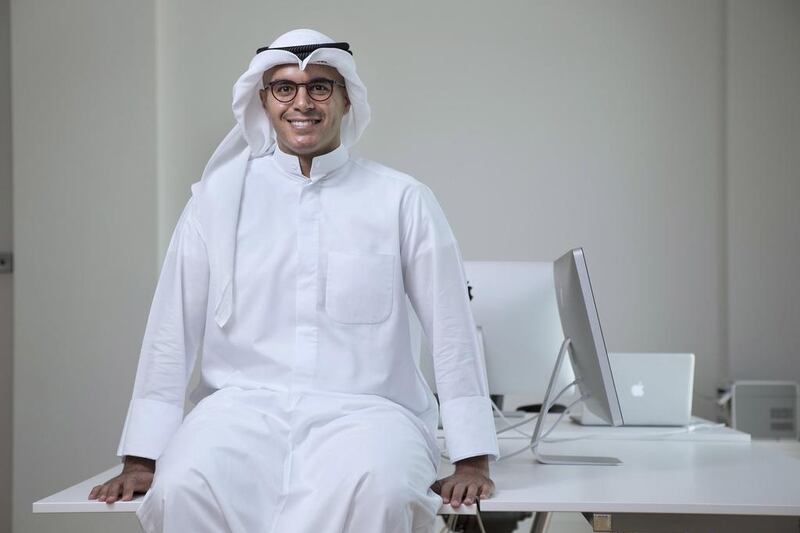Abdullah Alzabin’s CV reads like the textbook career path of a high-flying executive.
The 32-year-old Kuwaiti started out in private equity – first in New York, then with NBK Capital in Dubai – before completing an MBA at Harvard Business School, an internship at Morgan Stanley and two years with Bain & Company in San Francisco.
But after an impressive early career that looked certain to lead to the top of the corporate ladder, Mr Alzabin threw the textbook out of the window and left finance for a radically different game – mobile apps.
While some might not think that has the same cachet as a career on Wall Street or in the DIFC, Mr Alzabin says his chosen field is gaining recognition in the Arab world.
“It was a difficult decision to leave a prestigious institution such as Bain & Company and the career path that I had set for myself,” he says. “But the excitement you get from being in this industry, building something and taking this kind of risk is not comparable. It’s a new frontier.”
Having swapped the boardroom for the app store, Mr Alzabin now runs Lumba, which specialises in downloadable games for smartphones.
Mr Alzabin and his business partner and anchor investor Ali Diab established the company in January 2012 in San Francisco, where it still has a small creative office. The company is building a team in Dubai, where Mr Alzabin is relocating.
Its first two games were Desert Tycoon, a city-building title inspired by the development of Arabian Gulf states after the discovery of oil, and Tribal Rivals, a combat strategy game set in early 20th-century Arabia. Between them they have about three million downloads. It has just released a third game, and more are in the pipeline.
Mr Alzabin, as the chief executive of Lumba, acts as a product manager for the games, conceiving ideas before commissioning the creative work and software development teams in the Middle East and Vietnam. The company has about 25 employees, including some part-time students in Saudi Arabia who use social media to help build buzz among Arab youth.
“We see a democratised access to entertainment with [mobile devices],” Mr Alzabin says. “If Walt Disney was to start Disney today, I think he would think twice about going into animation first … I think he would look at a more interactive and engaging medium such as games.”
Lumba offers its games – in Arabic and English – for free on Apple and Android devices, and makes its money through in-app purchases that allow you to perform special tasks. Mr Alzabin says the company is profitable, although he did not disclose financials.
It was while studying at Harvard that Mr Alzabin made his big career change. He started an MBA course in 2008, just before the Lehman Brothers bankruptcy, when the “world turned upside down”, he says. This prompted him and many of his fellow students to think outside finance.
Mr Alzabin says he received some “puzzled looks” about his new career path. But three years on, his friends are excited about his company.
“It’s only a matter of time until a bigger subset of the population realises that this is a real industry, and it’s one that you can build a career out of … and find great success if you conceive the right idea,” he says.
Despite that, he says there are “inherent risks” in being an app entrepreneur and some social barriers to pursuing such careers still exist in the Arab world. “What is required for people to get over the stigma of failure and taking risks in this part of the world is a consistent string of successes,” he says. “And I define successes as financial exits.”
Faisal Alhazza, 29, from Saudi Arabia, is the developer of the mobile app Jami’e – which roughly translates as “university student”.
The idea for the app came when Mr Alhazza was studying information systems at King Saud University. He found it difficult to keep track of the classes he had attended – and after inadvertently skipping too many, was not allowed to sit the exam on one of his courses.
Jami’e – which launched on the Apple App Store – helps students track how many classes they have attended. It saves a user’s university schedule and reminds them of tasks.
Mr Alhazza graduated in January 2013, and launched the app with his business partner Mohammad Al Orini in October 2014. It has clocked up more than 70,000 free downloads and the duo is looking at ways to profit from it.
Mr Alhazza was not sure what career to pursue before starting university – but is now certain developing mobile apps is right for him.
“Mobile apps as a career path is worthy,” he says. “It is the new thing, a new wave, and it’s going to last forever.”
The textbook, it seems, is already being rewritten.
business@thenational.ae
Follow The National's Business section on Twitter





